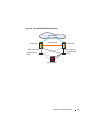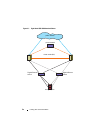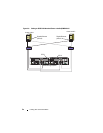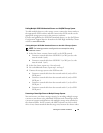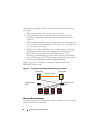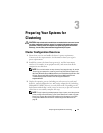
Preparing Your Systems for Clustering 29
11
Test the failover capabilities of your new cluster.
NOTE: For Failover Clusters configured with Windows Server 2008, you can
also use the Cluster Validation Wizard.
12
Configure highly-available applications and services on your Failover
Cluster. Depending on your configuration, this may also require providing
additional LUNs to the cluster or creating new cluster resource groups.
Test the failover capabilities of the new resources.
13
Configure client systems to access the highly-available applications and
services that are hosted on your failover cluster.
Installation Overview
Each cluster node in the Failover Cluster must have the same release, edition,
service pack, and processor architecture of the Windows Server operating
system installed. For example, all nodes in your cluster may be configured
with the Windows Server 2003 R2, Enterprise x64 Edition operating system.
If the operating system varies among nodes, it is not possible to configure a
failover cluster successfully. It is recommended that you establish server roles
prior to configuring a failover cluster, depending on the operating system
configured on your cluster.
For a list of Dell PowerEdge systems, iSCSI NICs, recommended list of
operating system variants, and specific driver and firmware revisions, see the
Dell Cluster Configuration Support Matrices located on the Dell High
Availability Cluster website at www.dell.com/ha.
For more information on deploying your cluster with Windows Server 2003
operating systems, see the Dell™ Failover Clusters with Microsoft Windows
Server 2003 Installation and Troubleshooting Guide located on the Dell
Support website at support.dell.com. For more information on deploying
your cluster with Windows Server 2008 operating systems, see the Dell
Failover Clusters with Microsoft Windows Server 2008 Installation and
Troubleshooting Guide located on the Dell Support website at
support.dell.com.



